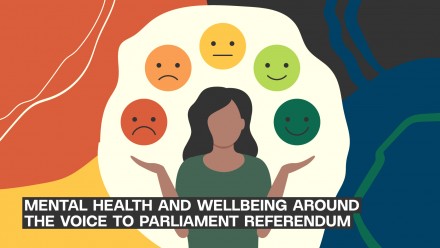Information, resources, and supports relating to the Voice to Parliament Referendum
Share
If you need to talk to someone, call 13YARN on 13 92 76 (24 hours/7 days) to talk with an Aboriginal or Torres Strait Islander Crisis Support worker, or see your local ACCHO, AMS, GP, or social and emotional wellbeing service for mental health support. See below for more information and links.
Services and supports
If you need crisis support: Call 13YARN on 13 92 76 (24 hours/7 days) to talk with an Aboriginal or Torres Strait Islander Crisis Support worker. This crisis line is run by Aboriginal and Torres Strait Islander people, for Aboriginal and Torres Strait Islander people. It is a free and confidential service. Find more information at: https://www.13yarn.org.au/.
If you are looking for mental health support: contact your local ACCHO, AMS, GP, or SEWB service. See https://www.naccho.org.au/naccho-map/ for a map of Aboriginal Community Controlled Health Organisations, or see here for a list of services.
For resources around mental health, wellbeing, and social and emotional wellbeing: Visit Gayaa Dhuwi (Proud Spirit) Australia, the peak body for Aboriginal and Torres Strait Islander social and emotional wellbeing, mental health, and suicide prevention, and the Healing Foundation, an Aboriginal and Torres Strait Islander organisation promoting trauma-aware, healing-informed practice.
For help in supporting others: Mob want to be there to support each other. Getting support from people with lived experience is valuable to ensure the care you receive is culturally safe. See the Stronger Together webpage by R U OK for stories and practical tips to empower you to support others.
For self-care resources: The Healing Foundation has outlined some tips for looking after yourself and keeping your family and community strong, along with some additional resources around having challenging conversations, dealing with misinformation and disinformation and racial stress and trauma. ReachOut have also prepared some resources on how to ease the pressure off mob and share the cultural load, along with some tips on coping when you feel like a spokesperson for mob. For resources for service providers: See WellMob for online resources for Aboriginal and Torres Strait Islander frontline health and wellbeing workers, with a focus on social and emotional wellbeing.
For resources for service providers: See WellMob for online resources for Aboriginal and Torres Strait Islander frontline health and wellbeing workers, with a focus on social and emotional wellbeing.
Information about the Referendum and the process of voting
The Referendum resources page on the AEC website has a number of resources with factual information about the Referendum and FAQs: https://www.aec.gov.au/referendums/
The website includes the following resources:
- Factsheet about what a referendum is, who needs to vote, when and where to vote, how to vote, and the role of the AEC: https://www.aec.gov.au/referendums/files/resources/referendum-factsheet.pdf
- Factsheet on how to vote in a referendum: https://www.aec.gov.au/referendums/files/referendum-formality-factsheet.pdf
- Factsheet about disinformation and checking the source of information: https://www.aec.gov.au/referendums/files/2023-referendum-stop-and-consider-factsheet.pdf
To enrol to vote, or to check your details, online go to www.aec.gov.au. To enrol using a paper form, you can: download and print www.aec.gov.au/enrol/form.htm, collect from a local AEC office, or call 13 23 26 to be sent a copy.
The Voice website includes information and about the Referendum: https://voice.gov.au/
- It includes resources for Aboriginal and Torres Strait Islander peoples, including in language: https://voice.gov.au/community-toolkit/first-nations
- It includes a First Nations community toolkit to support sharing of resources: https://voice.gov.au/sites/default/files/2023-05/voice-first-nations-community-toolkit.pdf
The ABC has produced a 13-minute video explaining “Everything you need to know about the Indigenous Voice Referendum”.
eSafety resources for Aboriginal and Torres Strait Islander peoples
Hear stories from mob in language and find tips to help you be deadly online: https://www.esafety.gov.au/first-nations
Reporting racism
If you experience or witness racism, you can report it to:
- Call it Out, The First Nations Racism Register;
- The Australian Human Rights Commission;
- The eSafety Commissioner, for online incidents;
- The Australian Communications and Media Authority (for incidents in the media);
- The Police, if you think you or someone else may be in danger, or if you think the behaviour was a criminal offense;
- Your State or Territory-based anti-discrimination commission; or,
- The Australian Health Practitioner Regulation Agency (Ahpra) or your local health complaints organisation if you have concerns about a health practitioner. · For links, see: https://itstopswithme.humanrights.gov.au/take-action/responding-to-racism and https://www.ahpra.gov.au/Notifications/Concerned-about-a-health-practitioner.aspx.
Information for non-Indigenous people on being an ally
See the Ending Racism video and Check Up resources at https://mk-engaged.anu.edu.au/ending-racism/.
The Australia Human Rights Commission and ReachOut have also put together some tips on being an ally.










